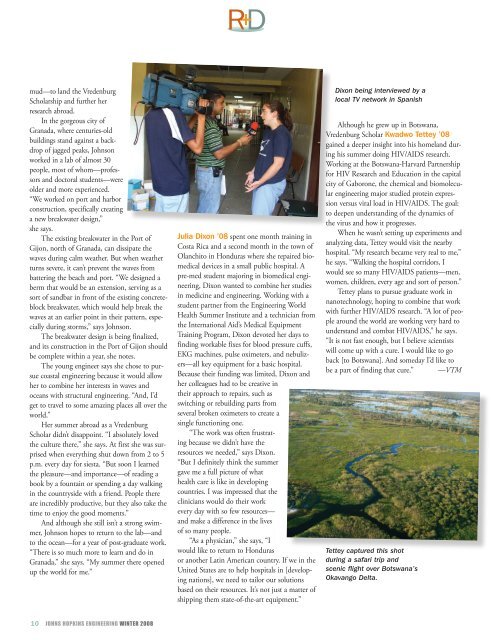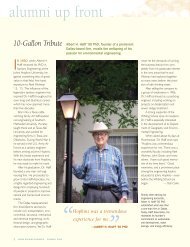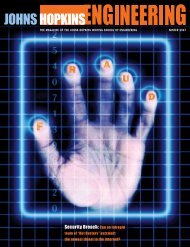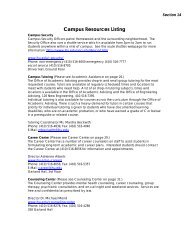Whither the Job Market?: - Johns Hopkins University Whiting School ...
Whither the Job Market?: - Johns Hopkins University Whiting School ...
Whither the Job Market?: - Johns Hopkins University Whiting School ...
You also want an ePaper? Increase the reach of your titles
YUMPU automatically turns print PDFs into web optimized ePapers that Google loves.
mud—to land <strong>the</strong> Vredenburg<br />
Scholarship and fur<strong>the</strong>r her<br />
research abroad.<br />
In <strong>the</strong> gorgeous city of<br />
Granada, where centuries-old<br />
buildings stand against a backdrop<br />
of jagged peaks, <strong>Johns</strong>on<br />
worked in a lab of almost 30<br />
people, most of whom—professors<br />
and doctoral students—were<br />
older and more experienced.<br />
“We worked on port and harbor<br />
construction, specifically creating<br />
a new breakwater design,”<br />
she says.<br />
The existing breakwater in <strong>the</strong> Port of<br />
Gijon, north of Granada, can dissipate <strong>the</strong><br />
waves during calm wea<strong>the</strong>r. But when wea<strong>the</strong>r<br />
turns severe, it can’t prevent <strong>the</strong> waves from<br />
battering <strong>the</strong> beach and port. “We designed a<br />
berm that would be an extension, serving as a<br />
sort of sandbar in front of <strong>the</strong> existing concreteblock<br />
breakwater, which would help break <strong>the</strong><br />
waves at an earlier point in <strong>the</strong>ir pattern, especially<br />
during storms,” says <strong>Johns</strong>on.<br />
The breakwater design is being finalized,<br />
and its construction in <strong>the</strong> Port of Gijon should<br />
be complete within a year, she notes.<br />
The young engineer says she chose to pursue<br />
coastal engineering because it would allow<br />
her to combine her interests in waves and<br />
oceans with structural engineering. “And, I’d<br />
get to travel to some amazing places all over <strong>the</strong><br />
world.”<br />
Her summer abroad as a Vredenburg<br />
Scholar didn’t disappoint. “I absolutely loved<br />
<strong>the</strong> culture <strong>the</strong>re,” she says. At first she was surprised<br />
when everything shut down from 2 to 5<br />
p.m. every day for siesta. “But soon I learned<br />
<strong>the</strong> pleasure—and importance—of reading a<br />
book by a fountain or spending a day walking<br />
in <strong>the</strong> countryside with a friend. People <strong>the</strong>re<br />
are incredibly productive, but <strong>the</strong>y also take <strong>the</strong><br />
time to enjoy <strong>the</strong> good moments.”<br />
And although she still isn’t a strong swimmer,<br />
<strong>Johns</strong>on hopes to return to <strong>the</strong> lab—and<br />
to <strong>the</strong> ocean—for a year of post-graduate work.<br />
“There is so much more to learn and do in<br />
Granada,” she says. “My summer <strong>the</strong>re opened<br />
up <strong>the</strong> world for me.”<br />
0 JOHNs HOpkiNs ENGiNEERiNG WiNTER 2008<br />
Julia Dixon ’08 spent one month training in<br />
Costa rica and a second month in <strong>the</strong> town of<br />
Olanchito in Honduras where she repaired biomedical<br />
devices in a small public hospital. A<br />
pre-med student majoring in biomedical engineering,<br />
Dixon wanted to combine her studies<br />
in medicine and engineering. Working with a<br />
student partner from <strong>the</strong> Engineering World<br />
Health Summer Institute and a technician from<br />
<strong>the</strong> International Aid’s Medical Equipment<br />
Training Program, Dixon devoted her days to<br />
finding workable fixes for blood pressure cuffs,<br />
EKG machines, pulse oximeters, and nebulizers—all<br />
key equipment for a basic hospital.<br />
Because <strong>the</strong>ir funding was limited, Dixon and<br />
her colleagues had to be creative in<br />
<strong>the</strong>ir approach to repairs, such as<br />
switching or rebuilding parts from<br />
several broken oximeters to create a<br />
single functioning one.<br />
“The work was often frustrating<br />
because we didn’t have <strong>the</strong><br />
resources we needed,” says Dixon.<br />
“But I definitely think <strong>the</strong> summer<br />
gave me a full picture of what<br />
health care is like in developing<br />
countries. I was impressed that <strong>the</strong><br />
clinicians would do <strong>the</strong>ir work<br />
every day with so few resources—<br />
and make a difference in <strong>the</strong> lives<br />
of so many people.<br />
“As a physician,” she says, “I<br />
would like to return to Honduras<br />
or ano<strong>the</strong>r Latin American country. If we in <strong>the</strong><br />
United States are to help hospitals in [developing<br />
nations], we need to tailor our solutions<br />
based on <strong>the</strong>ir resources. It’s not just a matter of<br />
shipping <strong>the</strong>m state-of-<strong>the</strong>-art equipment.”<br />
Dixon being interviewed by a<br />
local TV network in Spanish<br />
Although he grew up in Botswana,<br />
Vredenburg Scholar Kwadwo tettey ’08<br />
gained a deeper insight into his homeland during<br />
his summer doing HIV/AIDS research.<br />
Working at <strong>the</strong> Botswana-Harvard Partnership<br />
for HIV research and Education in <strong>the</strong> capital<br />
city of Gaborone, <strong>the</strong> chemical and biomolecular<br />
engineering major studied protein expression<br />
versus viral load in HIV/AIDS. The goal:<br />
to deepen understanding of <strong>the</strong> dynamics of<br />
<strong>the</strong> virus and how it progresses.<br />
When he wasn’t setting up experiments and<br />
analyzing data, Tettey would visit <strong>the</strong> nearby<br />
hospital. “My research became very real to me,”<br />
he says. “Walking <strong>the</strong> hospital corridors, I<br />
would see so many HIV/AIDS patients—men,<br />
women, children, every age and sort of person.”<br />
Tettey plans to pursue graduate work in<br />
nanotechnology, hoping to combine that work<br />
with fur<strong>the</strong>r HIV/AIDS research. “A lot of people<br />
around <strong>the</strong> world are working very hard to<br />
understand and combat HIV/AIDS,” he says.<br />
“It is not fast enough, but I believe scientists<br />
will come up with a cure. I would like to go<br />
back [to Botswana]. And someday I’d like to<br />
be a part of finding that cure.” —VTM<br />
Tettey captured this shot<br />
during a safari trip and<br />
scenic flight over Botswana’s<br />
Okavango Delta.





